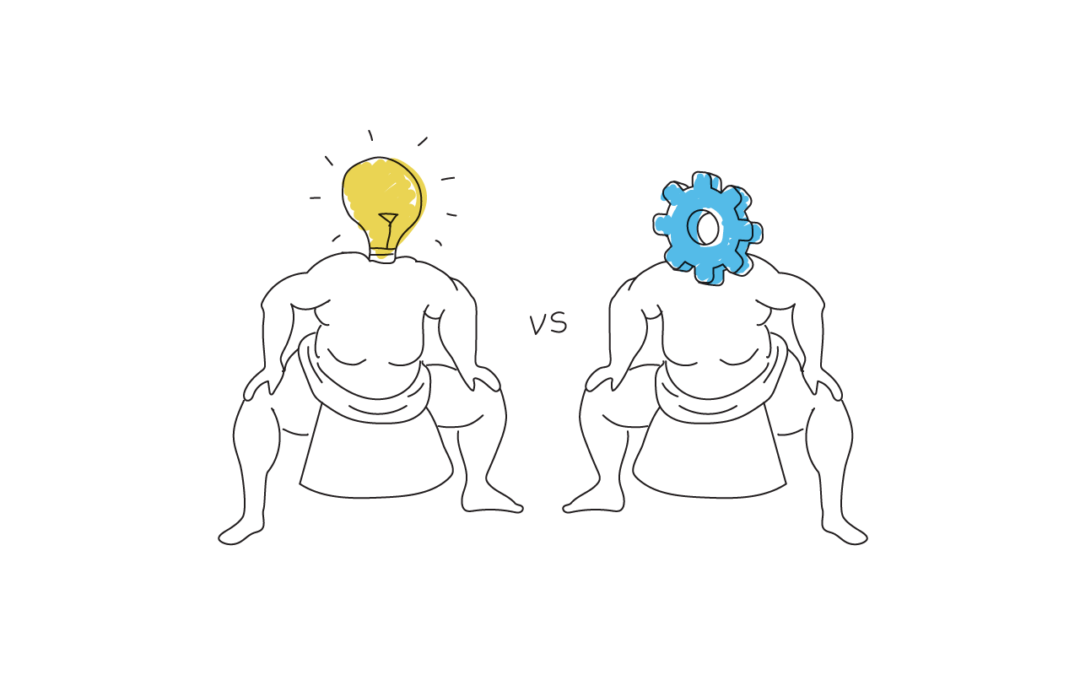During many occasions, while interacting with corporate managers, I have sensed a great deal of resistance towards creative ideas. Most of the time, embracing those creative ideas would mean moving out of the comfort zone. But no one likes to admit it. Instead, many managers bring new angle to the discussion – execution. Hence, ‘I believe in execution’ or ‘we first need to improve our execution’ becomes a legitimate reason for staying away from creative ideas.
And to make their point appear more weighty, managers often toss in a common expression — ‘Ideas are dime a dozen, execution is all that matters.’
There has been enough noise created around the topic of ideas vs execution. I don’t want to further add to the noise. But I would like to bring a new dimension to it by asking you a question:
What type of ideas are you executing?
Let me explain. Broadly, you may be executing one of the following types of ideas:
Wrong ideas

Let me clarify. No one deliberately pursues the wrong ideas. The problem comes when one loses sight of the bigger picture and gets caught in an activity trap.
Stephen Covey in in his famous book, ‘Seven Habits of Highly Effective People,’ shares an example of a person climbing efficiently on a ladder, only to discover that the ladder has been leaning against the wrong wall.
A wrong idea will always take you to a wrong destination. A wrong idea, executed well, will take you to your destination faster. But the destination won’t be the one where you wanted to reach in the first place.
Dime a dozen ideas

This is the time to go back to the earlier mentioned quote, “Ideas are dime a dozen, execution is all that matter.”
Are your ideas really dime a dozen? If yes, then execution doesn’t matter. I would rather urge you to stop executing them right now. This will save countless man hours of your organization from getting wasted. The reason is simple. Mediocre ideas, no matter how well they are executed, will still give you mediocre results.
The above may appear to you as a no-brainer. But on many of the occasions I am amazed to see organizations getting so lost in the execution trap that they don’t find time to even look at the ideas they are pursuing with execution excellence.
Good ideas

On the face of it, choosing good ideas to execute makes sense. But in reality, it’s the riskiest thing to do. I will give you three reasons to support my argument.
Good ideas are undifferentiated: The marketplace is crowded with too many players thinking of similar good ideas and therefore competing with each other using an almost identical strategy. The outcome? Even if you execute it well, you still get lost in the crowd.
Good ideas make you complacent: In the short run, organizations may do well. This brings in a sense of complacency or to some degree, even arrogance. Once organizations settle for good ideas, they stop demanding breakthrough or disruptive ideas from their employees. They even stop catching the signals in the organization. That brings us to the next point.
Good ideas make you vulnerable: If your competition is busy executing ‘not so good’ ideas, doing good may be a good option. But when your competition is doing something great, the same ‘good’ makes you vulnerable. At this stage, let me take you back to the year 2013. When Nokia’s CEO Stephen Elop made an announcement about Nokia being acquired by Microsoft. He ended his speech by saying, “We didn’t do anything wrong, but somehow, we lost”. At face value, this may appear true. Their strategy was good. For many years, their performance had been good. This mindset of ‘good’ made them complacent and vulnerable towards the competition. They stopped catching critical signals from the environment. When Nokia’s competitors brought out their disruptive ideas to the market, the company continued pursuing its good ideas. That’s the only wrong thing it did. As it turned out, its ‘good’ was not good enough to survive the onslaught of breakthrough ideas.
Good is the enemy of Great
– Jim Collins, Good to Great
Breakthrough ideas

We discussed ideas that are dime a dozen. But breakthrough ideas belong to a different league. They are priceless. Forget about dimes, you can’t shop for them with a boatload of dollars. Even big banner consulting firms don’t offer you innovative ideas for the fat fees that they charge. The only way to get these ideas is by building the organization’s internal capability.
All ideas are not born equal. The great ideas are the ones that matter most.
What about execution?
Execution makes innovation happen. Without execution, ideas will remain in the boardroom. Some organizations have built execution excellence as their most precious asset. What do you think such organizations should be doing with it? They must not waste it on the mediocre, wrong or even good ideas. Instead, they should leverage it to the fullest by applying it on breakthrough ideas.
This is what Steve Jobs did. He is regarded as one of the best innovative minds. But when you speak to people who worked closely with Jobs, they will tell you that he was equally good at ruthlessly executing his ideas. He drove execution at Apple in every imaginable way. But he didn’t run after every idea. After his return to Apple, he pruned the number of products from 350 to 10.
Okay, perhaps Steve Jobs was an exception. Everyone can’t be a master of both ideation as well as execution. Most of the times, leaders are strong in one of the areas. Does that mean you have to make a trade-off between ideas and innovation?
Not necessary.
Take the example of the intuitive, creative software designer Pierre Omdiyar, who started a new venture called AuctionWeb. Omdiyar knew that execution was not his greatest strength. He came across Jeff Skoll, whose skills in analysis and in the practical side of running a business made him a perfect match to Omidiyar’s skills . On Omdiyar’s invite, Skoll joined him as his first employee. Later, they changed the name of the company from AuctionWeb to eBay, which is now a multi-billion dollar business that operates in over 30 countries.
So, if execution is your top strength, stop undermining the importance of ideas, instead tag along with minds that are full of great ideas. When the best of ideas are driven through great execution, the magic of innovation happens.
And the winner is…
Coming to the question that I raised in the title of this post — ideas vs execution. Could you spot the winner? In case you didn’t, the winner is… your competition..
Because the very mindset of ‘ideas vs execution’ is a flawed one. Any organization that believes that ideas and execution are each other’s rivals and chooses one among them does the greatest favour to its competitors who operate with the mindset of ‘idea AND execution’

The bottom line:
If your organization is pursuing execution excellence, do it by all means. But never be under the illusion that it will compensate for the lack of creative ideas. Encourage people to think creatively. Train them in creative thinking. Everyone can learn to think creatively. Raise your bar. Demand for those creative ideas that will offer your organization a clear competitive edge. And execute them with fervour.
This is how great organizations disrupt the market with their innovative ideas.
What about you?
Is execution your core strength, but you feel handicapped due to a lack of creative ideas? I can assure you, if you pursue the subject of creativity relentlessly, you can become an idea machine. Not very sure? Download my FREE eBook: “Connecting the Dots: The secret behind the creativity of great minds.” This will be a great way to start your creative journey.
Do you feel that you already have a creative bent of mind? That’s great! This eBook will put your creativity on a fast track.
I would love to receive your feedback about the eBook.
Also, I look forward to hearing your thoughts on ‘Idea vs Execution’. Please leave your feedback in the comments section.


3 Comments
People says , execution is main course meal. Creativity is dessert. You can’t enjoy dessert in empty stomach. This is probably due to our prevailing notion about creativity. We have given very high place to creativity. Too high to be reached by normal persons. Creative people are exclusive, creativity is illusive. Such notion only made it uncommon and an enemy of execution.
The kind of detail attention and importance we give to execution , some times it over powers the objective of execution it self. Why can’t we keep the focus at challenge , making it even more challenging by putting some extra stretch, and think through how to take it head-on, in a creative way? Execution is imperative and will be largely driven by motivation of the stretch goal and sense of achievement.
Miliind’s article above gives an impression that creativity is not un-reachable by normal people. Everybody definitely can be creative, actually in his domain, super creative, so as that he solves even routine problems creatively hence, more effectively & efficiently.
We often see things as a dichotomy, two sides of a coin and it’s not wrong to understand what sides are at play. The article above however is quite on the mark as both sides have causality and effect on each other. Therefor it’s rigor that stabilizes the whole. The best projects I have been involved in had both a rigorous creativity behind them and a great team that applied rigor to the execution whilst remaining focused on the original idea. These sorts of conditions usually result in projects that everybody loves working on.
I feel that everybody wants to become like Steve jobs and other CEOs of sucessful firms like Google, Amazon. eBay, Alibaba etc etc ect. I am sick of all the business books and journals wanting others to imitating these ideas to become sucessfull. I personally don’t think it works like that. These so call sucessful people were in the right place at the right time and employed a little bit of efford and determination to bring their ideas to execution. I believe anybody can be sucessful if he or she wants to be. Simple ideas are the best and easily executable and it should come from your employment or self employment as part of your remit. If you are happy in the work you do you can come up with ideas. Most people are not happy in the job they are doing and only doing it for the money hence the lack of ideas.